Al-Alaq: Our critical position is very excellent
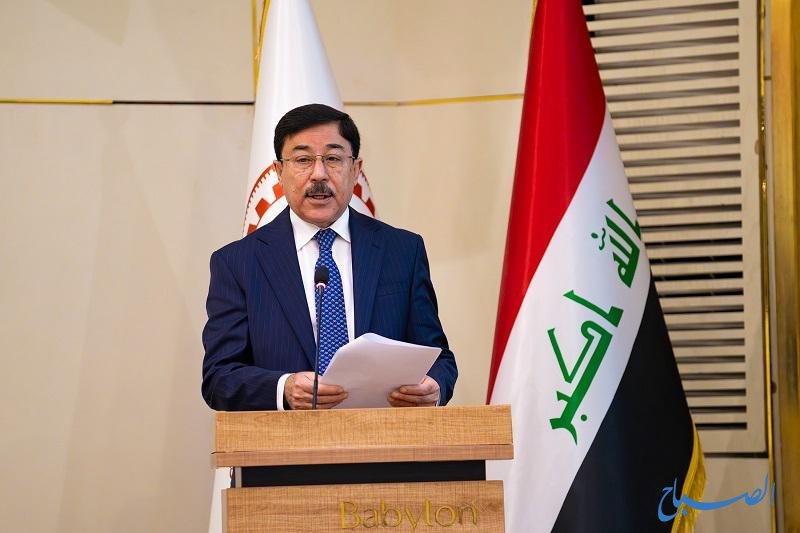
Thanks to the well-studied and wise financial policies of Prime Minister Mohammed Shia al-Sudani's government, the country's monetary position has become very excellent, as described by the Governor of the Central Bank of Iraq, Ali Mohsen Al-Alaq, in a special interview with "Al-Sabah".
The video for this Blogpost is below here:
This position came to reassure citizens and confirm that there are no real fears of any economic crises occurring here or there. Al-Alaq said in a special interview with "Al-Sabah": "The monetary position in Iraq is (very excellent) at the present time in terms of controlling inflation and the high adequacy of foreign reserves, which enables the Central Bank to remain stable, defend the exchange rate, and achieve monetary stability, despite the circumstances surrounding the country and the region."
He explained that "the reserve covers our needs, and this is what distinguishes the Central Bank of Iraq compared to other central banks in the region," noting that "the Central Bank adopts an unconventional monetary policy that is not based only on achieving monetary stability."
Al-Alaq announced the Central Bank's success in implementing the transition plan for "foreign transfers, in line with international practices and standards, and that it is currently taking place smoothly and transparently - especially covering imports at the official exchange rate - which leads to general stability in prices." Regarding the (Riyada) Bank, the Governor of the Central Bank said: "The (Riyada) Bank will be contributed by Iraqi banks and supported by the Central Bank itself in order to diversify the production base, reduce unemployment levels, and provide basic pillars for sustainable development with the support of specialized international organizations."
NOV 30 24
Warning against canceling the electronic platform: It may end the banking system in Iraq
The Central Bank of Iraq intends to cancel the “electronic platform” for financial transfers early next year.
The researcher and specialist in financial and banking affairs, Mustafa Hantoush, says that the Central Bank of Iraq, by not finding real solutions for transfers and moving towards stopping the (fitr) platform and handing over the Iraqi dollar to (4) banks owned by investors and banks (Jordanian and Gulf), will fire the mercy bullet at the entire Iraqi banking system.
Hantoush added during his interview with Iraq Observer that “the banking system in Iraq as a whole will be punished, which will lay off nearly (100) workers in the Iraqi private banking sector in favor of Jordan and the Gulf States.”
He added, "He may demand social care for them, and the stability of the exchange rate will become difficult due to the monopoly of the dollar by these banks, and this may cause new fluctuations in the exchange rate."
The financial expert continues, “Thus, the Central Bank of Iraq is failing in one of the most important banking policies, which is the policy of achieving competition in the banking sector and preserving banking sovereignty. Therefore, we demand that the Central Bank come up with specific solutions, including extending the work of the (Fitr) platform in coordination with the new administration of the United States of America.”
He continued by saying, “It is necessary to guarantee the Iraqi banks to open an account for them in the correspondent banks in dollars (Citibank/JP Morgan) as the countries of the region have done.”
He pointed out that "it is also necessary to determine and announce the mechanism for cooperation and auditing with Ernst & Young regarding transfers in currencies other than the dollar (euro - yuan - lira - dirham)."
He explained that "the announcement of the results of the agreement and contract with the company (Olver Wyman) regarding the 28 penalized banks and what their fate will be."
The financial expert called for “the necessity of approaching the central banks of the countries (Turkey - Emirates - China - India) to agree to open branches of Iraqi banks to transform from a remittance relationship to a banking relationship in trade.”
The decision to cancel the electronic platform for money transfers represents a major challenge to the Iraqi economy, and may have direct effects on the exchange rate of the dollar against the Iraqi dinar.
This is what it included.. Al-Sudani leaves Spain heading to the capital, Baghdad
Prime Minister Mohammed Shia al-Sudani left Spain on Friday evening, heading to Baghdad, after concluding his official visit.
According to a statement issued by the Prime Minister’s media office and received by “Iraq Observer,” the visit included the following:
■ Meeting with the Spanish monarch, King Felipe VI.
■ Meeting with Spanish Prime Minister Mr. Pedro Sanchez.
■ Heading the Iraqi delegation in the extensive bilateral talks between the two countries.
■ Sponsoring the signing of a number of joint memoranda of understanding, as follows:
● Memorandum of Understanding for cooperation in the legal field and exchange of expertise.
● Memorandum of Cooperation between the Sovereign Guarantees Initiative Committee and the Spanish Government.
● Memorandum of Understanding between the Federation of Iraqi Chambers of Commerce and the Spanish Chamber of Commerce.
● Memorandum of Understanding between the Iraqi Federation of Industries and the Spanish Federation of Corporate Organizations/CEOE.
● Memorandum of Understanding for security cooperation between the Iraqi and Spanish Ministries of Interior.
● Memorandum of Understanding between the Iraqi Integrity Commission and the Spanish Attorney General.
● Memorandum of cooperation between Wasit Governorate and the Spanish construction company, Imatia.
● Bilateral Memorandum of Understanding between the University of Iraq and the Spanish University of Juan Carlos.
■ Participation in the Iraqi-Spanish Economic Forum held by the Spanish Chamber of Commerce.
■ A meeting of a group of Arab and Spanish elites at the Arab House Foundation in Madrid.
■ Meeting with the CEO of the International Olive Council.
■ Meeting with the President of the Spanish Peace Messengers Charitable Association.
■ Meeting with the Secretary-General of the United Nations World Tourism Organization.
■ Receiving representatives of the delegation of the Spanish company (Rheinmetall Expal).
■ Receiving a delegation from the Spanish company (Indra).
■ Receiving a delegation from the Spanish company (Airbus), specialized in the field of security and air defense systems.
■ Receiving a delegation from Ematia Consulttrans, a company specializing in trains.
■ Meeting a group of members of the Iraqi community in Spain.
■ Conducting an interview with the Spanish newspaper El Mundo.
■ Interview with Spanish International Television (TVE).
■ Interview with the Spanish news agency (EFE).
A specialized website that paints a positive picture of the future of investors’ work in the Iraqi energy sector
The "B Media Network" website, which specializes in oil and energy affairs, stated that energy projects in Iraq are moving in the right direction, as international investors have begun to take a new look at the development plans for these projects, while the Iraqi government is working to address the many obstacles that prevent doing business, while concerns about nationalization of resources, political conflict and insecurity have begun to fade with the current government committed to launching major projects.
While the London-based website noted that there is a “real push by the Iraqi government for reform” with a shared understanding of the needs of investors and the government, it described Crescent Petroleum as a pioneer in its work in the country, and it also sets an example of how to do business in Iraq, through its operations in the country since 2007, where it has been focused on a clear message of developing a local mindset.
The report, which was translated by Shafaq News Agency, said that foreign investors who will take a fresh look at Iraq now will see that there is a clear opportunity to meet halfway while the government adopts a more international outlook.
While the report noted that policymakers are focusing on a series of major reforms to the business environment in Iraq, it quoted energy specialist Jessica Obaid as saying that “political stability is a key enabler for investment, and many reform measures must be taken to enhance the business investment climate,” noting that the most important of these measures are transparency, providing incentives, ensuring timely payments, facilitating the issuance of licenses, and ensuring cost recovery.
According to Obaid, “implementing anti-corruption measures to enhance a transparent investment environment is the way forward, while resolving the sector’s structural issues and business climate.”
The report quoted Abbas Kadhim, a researcher at the American Atlantic Council Institute, as saying that “the current attempt to obtain flared gas could have started in 2007-2008, but the officials at the time were more ideological than practical, which meant that they did not give the oil companies what they needed to invest,” adding that “they did not like the idea of multinational companies entering Iraq and influencing the government.”
The report pointed out that these established positions forced new investors to adopt a more practical approach. In this context, it referred to the "Hilal Oil" company, which came to Iraq in 2007, when the country was on the brink of civil war.
According to Hilal CEO Majid Jaafar, having a local mindset (reflecting the company’s Iraqi roots) and a can-do approach meant the company was able to drill wells, install seismic processing facilities and a pipeline within 15 months, working alongside the Kurdistan Regional Government.
The report quoted Jaafar as saying that balancing investor expectations with government expectations is “the key to success,” explaining that “Iraq must focus on maximizing the value of oil efficiently, rather than treating contracts as a zero-sum game with investors.”
Jaafar explained that sometimes there is a mismatch in expectations between the government and foreign investors, adding that when it comes to natural gas, the priority should be generating power in Iraq, while “the priority of the major international companies is to put the gas on a ship and ship it to the world market.”
The report stated that the prevailing feeling now is that the situation in Baghdad is changing, as the government of Mohammed Shia al-Sudani is focusing on implementing major projects, with large budgetary resources allocated, noting that the government has made it clear that it wants new partners to come and invest in the energy infrastructure to enhance energy security in Iraq and support the country's role in the growing regional energy sector.
In addition, the report said the government had introduced broader reforms to the executive branch, to assess government performance and tackle corruption. “There is now a lot of liquidity in the Iraqi system, the stock market has grown by 100 percent, and you can see the impact in the construction cranes dotting the skyline of Baghdad and in the new housing projects,” Jaafar was quoted as saying.
According to Jaafar, while bureaucracy, corruption and lack of electricity continue to pose challenges to doing business, the overall trend is positive and the government’s desire to attract investment and address the industry’s problems is very clear.
The report pointed to the cooperation between an institution affiliated with the World Bank through the signing of an agreement on a partnership between the public and private sectors to rehabilitate, expand and maintain Baghdad International Airport, which constituted the first real partnership project between the public and private sectors.
He also pointed out that one of the most prominent challenges facing investors is the weakness of the local banking sector, noting that the banks, which consist of about 70 private banks and 6 state-owned banks, are not in a good condition that allows them to support financing the energy sector.
The report quoted the CFO of Al Hilal Company, Neeraj Agrawal, as saying that “so far, it has been mainly Western and Chinese energy companies that have committed to investing in Iraq, noting that Western companies finance their investments through their balance sheets, as does China, which also receives some assistance from its government.”
The report indicated that among the areas in which new financing for investments can be secured is the use of capital markets, noting that some oil and gas companies have issued bonds in the Kurdistan Region, including Pearl Petroleum, Genel Energy, and the Norwegian company DNO.
The report quoted Agrawal as saying that this step was a successful model in providing capital, and the bond market was an important means for strong projects managed by good companies, adding that "there is no reason why this cannot be done in federal Iraq."
The view in Baghdad, the report concluded, is that with a little encouragement, support and stability, the pieces of the financing jigsaw will work together to help Iraq's energy sector achieve its true potential.
Government Advisor: Number of Bank Accounts in Iraq Increases to More Than 14 Million
The Prime Minister's Advisor for Financial and Economic Affairs, Mazhar Muhammad Salih, confirmed on Saturday that financial inclusion in Iraq, represented by bank accounts, has risen to 14 million, with 20 million users, while he pointed out that Iraq is witnessing a boom in adopting e-governance as a basis for integrity and financial efficiency.
Saleh said in a statement reported by the official news agency, and reviewed by "Al-Eqtisad News", that "the pillar of financial inclusion is represented by the number of personal bank accounts, as inclusion aims to enable individuals and companies to access financial services appropriate to their needs in an easy and reasonable manner, while ensuring legal protection and transparency."
He added, "Financial inclusion focuses on enhancing the financial integration of economically and socially marginalized groups, such as the poor, women, and youth, as well as small and medium-sized enterprises that lack adequate access to financing in the banking system by opening a bank account."
He pointed out that "national indicators confirm that financial inclusion in Iraq has increased from 20% to 48% at the present time compared to previous years," explaining that "the reason is due to two main factors, which are the localization of salaries of employees, workers, retirees and social care, and the other is the spread of digital payments or digital financial inclusion."
Saleh stressed that "Iraq is witnessing a boom within the government program policy that considers e-governance as the basis for integrity, transparency, financial and economic efficiency, and optimal investment of resources and time," noting that "the latest statistics indicate that the number of bank accounts is about 14 million bank accounts and more than 20 million payment card users, which means an increase in the financial inclusion rate from 20% to 48%, which is a rate measured by the number of bank accounts opened for adults in the population."
He continued, "There are a number of open bank accounts that are dormant or zero, which should be excluded to reach the correct number of open bank accounts. There are open and zero accounts belonging to expatriates, deceased people, bankrupt companies, companies that have left work, and individuals who have not dealt with their bank accounts opened in banks that are under guardianship or are in trouble, and other factors and hopes are many."
He continued, "The real criterion for adopting the bank account as a criterion for financial inclusion is the bank accounts opened for active individuals, not the zero or inactive ones, which requires excluding them from the statistics of banks and the Iraqi banking system in general."
Finance confirms its continued efforts to implement automation plans and use modern electronic systems
The Ministry of Finance confirmed, on Saturday, its continued efforts to implement automation and digital transformation plans and use modern electronic systems.
A statement by the Ministry of Finance, seen by Al-Eqtisad News, stated that "Minister Taif Sami chaired the regular meeting of the Opinion Board, in the presence of the Undersecretary of the Ministry and the general managers of the departments, banks, bodies and affiliated companies."
He explained that "the meeting discussed a number of topics included in the agenda, including reviewing the recommendations of the committees formed by the Opinion Authority for previous sessions, determining the stages of progress and achievement rates, in addition to discussing the proposed amendments in order to develop the ministry's performance and adapt it to the requirements and vision of modern financial management witnessed by the finance and business sector.
The statement added, "The meeting addressed the emphasis on implementing the recommendations of the Council of Ministers, and the emphasis on continuing the intensive efforts and providing the capabilities within the framework of the government program to develop banking financial performance, and implement financial and strategic plans, including automation and digital transformation, and the use of modern electronic systems and improving the reality of work, to provide the best services to citizens.
Iraq suspends official work on Tuesday, December 10 - Urgent
The General Secretariat of the Council of Ministers announced today, Saturday (November 30, 2024), that official work will be suspended in the country on Tuesday, December 10, on the occasion of Victory Day over ISIS.
A government source told Baghdad Today, " The General Secretariat of the Council of Ministers decided to suspend official work on Tuesday, December 10, on the occasion of the anniversary of the liberation of the land of Iraq from the terrorist gangs of the ISIS organization (Victory Day)."
It is noteworthy that Iraq announced on December 10, 2017, victory over ISIS and the liberation of all cities that were controlled by the organization.
Trade Bank of Iraq explains the reason for stopping ATMs
The Trade Bank of Iraq (TBI) denied, in a statement received by {Euphrates News}, a copy of it: "The stoppage of one of the ATMs."
He stressed that "what sometimes happens is a temporary interruption in the Internet service, which is then reconnected moments later."
Trade Bank of Iraq (TBI) explains the reasons for the stoppage of one of the ATMs
The Trade Bank of Iraq (TBI) denied the validity of what was circulated about the stoppage of one of the ATMs, explaining that what sometimes happens is a temporary interruption in the Internet service that is reconnected moments later.
The bank's media advisor, Aqil Al-Shuwaili, explained in a statement: "The bank has not recorded any permanent stoppage of the ATMs," noting that "momentary interruptions occur due to weak Internet connection, which is common in ATMs in all countries of the world due to technical problems in the communications networks."
He pointed out that "the message appearing in the ATM confirms that the ATM has stopped due to weak network and momentary disconnection," noting that "the bank owns 357 ATMs, including 140 distributed in commercial places, 40 in branches, in addition to 180 in the capital, Baghdad, while the rest of the devices were distributed to all governorates of Iraq."
He explained: "The bank has a specialized maintenance team to deal with electronic or mechanical malfunctions immediately, in addition to providing the customer service number attached to each bank card, where customer inquiries are received 24 hours a day."
Opening of a new branch of the Trade Bank of Iraq in Baghdad
The Trade Bank of Iraq announced today, Saturday, the opening of a branch in Al-Saydiyah, south of the capital, Baghdad.
The bank's media advisor, Aqeel Al-Shuwaili, said in a statement received by the Iraqi News Agency (INA), that "in continuation of implementing the bank's management plan to expand and open new branches and outlets throughout Iraq and with the aim of delivering banking services to the public at large, in providing the best services to citizens, we announce the opening of our new branch (Al-Saydiyah Branch) located in the capital, Baghdad, Al-Karkh side, Al-Saydiyah area.
" He added that "the bank will receive customers starting from Sunday, 12-1-2024, from (8) in the morning until (3) in the afternoon to provide all banking services."
Trump's sanctions are coming inevitably.. Will they include Iraqi oil and the dollar?
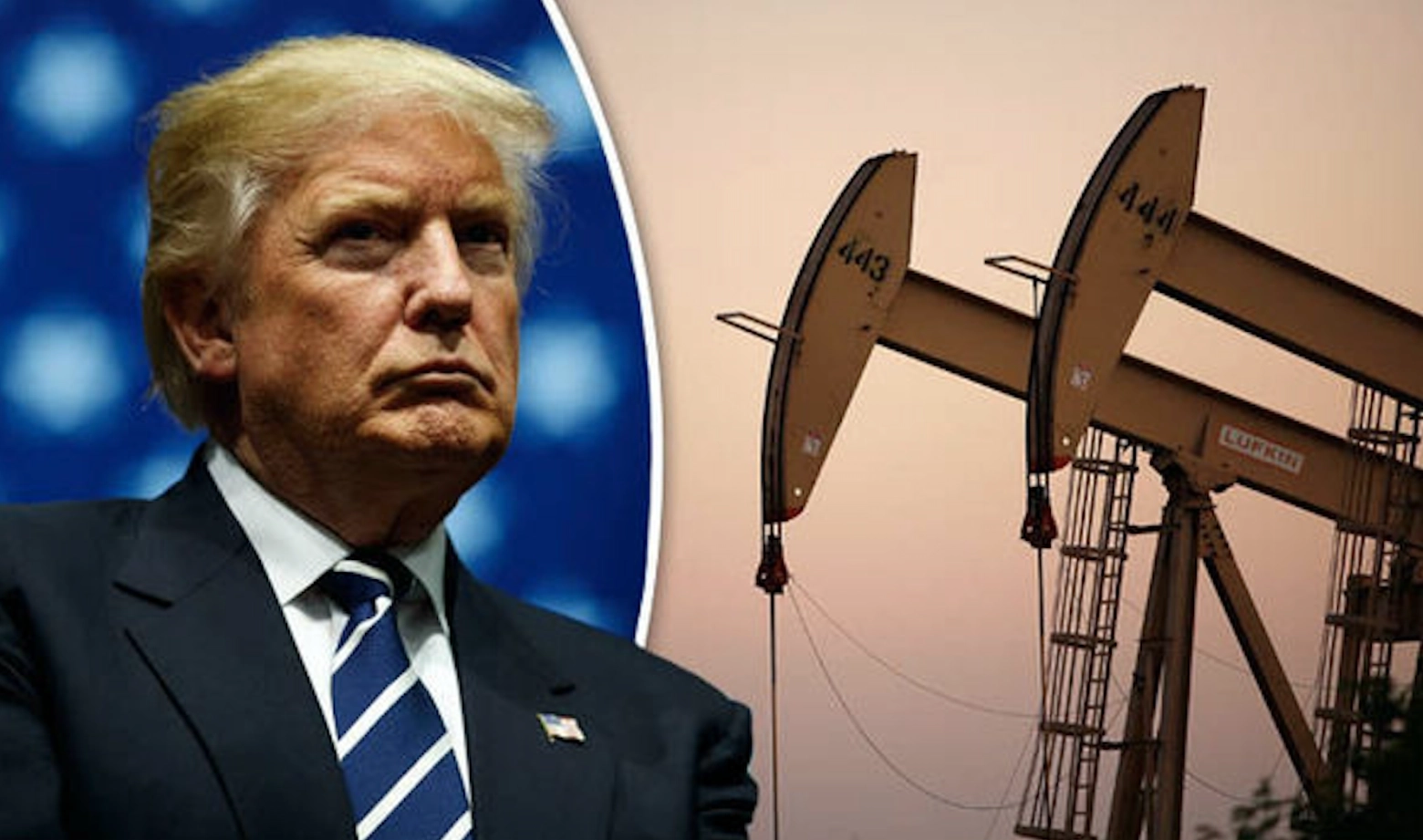
Economic affairs expert Ahmed Al-Tamimi commented today, Sunday (December 1, 2024), on the possibility of the new US President Donald Trump imposing sanctions on Iraqi oil during the next stage.
Al-Tamimi said in an interview with Baghdad Today, "The talk about Trump's desire to impose new sanctions on Iran could be true and sanctions could be imposed, but those sanctions cannot include Iraqi oil, because it has no relation to Iran and its support, and this oil is what the Iraqi state lives on and through which salaries of employees and retirees are paid, as well as other internal and external financial obligations."
He added, "Any American sanctions on Iraqi oil will cause major and serious problems in the global oil market, and therefore the hypothesis of sanctions on Iraqi oil is very unlikely and impossible, but Trump may take strict decisions on the issue of dealing in dollars between Iraq and Iran, and other control measures, but he will not come close to imposing any economic sanctions on Iraq under the pretext of fighting Iran."
With just weeks to go before he returns to the White House, Donald Trump and the people tasked with the president-elect's transition are canvassing the views of many on the Middle East, including those who care about Iraq.
Sources told American newspapers about some of the broad outlines of Trump’s approach, which are not related to Iraq first, but to Iran. They said that Trump and his aides are determined to confront Iran, and the first step will be to prevent Iran from using Iraq to smuggle oil, and to prevent Iran from exploiting the Iraqi banking and financial system to smuggle US dollars. The infiltration of Iranian weapons into Iraq, Syria and Lebanon will also be a direct target for the Americans, and if they do nothing directly in the weapons clause, Trump may open the door wide for Israel to expand its attacks on the Iranians and the factions loyal to them on Iraqi territory.
On Thursday (November 7, 2024), Bahaa Al-Nouri, a member of the Parliamentary Oil and Gas Committee, said that oil prices and the movement of the global oil market, including Iraq, may witness a change with the arrival of Donald Trump to the White House.
Al-Nouri told Baghdad Today, "OPEC is currently managing the movement of the oil market in a stable manner and it controls its price globally, but the oil sector may witness a change with the arrival of Trump to power in the United States, and this is what the coming period will witness."
He added, "The stability of the Middle East will contribute to the stability of oil in Iraq and the region, as foreign policy affects oil, its sale and price, especially since Iraq depends on the sale of oil by 95 percent, and any other problems will lead to a decrease in its prices globally."
Donald Trump won a new presidential term, making the businessman the second president in history to return to the White House in two terms, breaking a historic achievement that no one has achieved in 136 years, and for America and the world to face an exceptional period during which the world’s number one power is led by an exceptional figure, in light of a Republican majority in the House of Representatives and the Senate.
DEC 1 24
Parliamentary Finance Committee discusses with Oil Ministry amending budget on regional oil

The Parliamentary Finance Committee announced, on Sunday, December 1, 2024, that a meeting would be held with the Ministry of Oil to discuss amending the financial budget regarding the Kurdistan Region’s oil.
They talked about the need to confront any possible changes in oil prices.
According to a statement seen by "Ultra Iraq", the Parliamentary Finance Committee, headed by Atwan Al-Atwan, and in the presence of its members and a number of members of other parliamentary committees, hosted the Undersecretary of the Ministry of Oil for Extraction Affairs, Expert Basem Muhammad Khadir, the Director General of the Legal Department Salam Hamdan Dagher, the Director General of the Economic Department Alaa Al-Yasiri, and the Director General of the Oil Marketing Company (SOMO) Khadir Abbas, at the committee headquarters, to discuss amending the general budget items related to oil exports by the region.
The committee chairman stressed "the importance of the meeting and the need to invest it in the best possible way to confront any potential changes in oil prices" and "the importance of amending the item related to oil exports in the budget to address contracts related to production costs", pointing out "the disparity in the nature and mechanisms of extracting oil from different fields and that the committee will submit its report to the council for consideration".
The committee raised a number of questions about the basic standards related to production costs, in addition to the payment of financial allocations, and the extent of commitment to contract terms, while emphasizing the formulation of amendments that achieve justice in the distribution of resources, through data analysis and adapting contracts in line with national requirements.
For his part, the Undersecretary of the Ministry of Oil "reviewed the relationship between the ministry and the parliament to achieve the highest interest, speaking about the oil export file between the center and the region and the mechanisms for determining operational and investment costs," stressing "the importance of reaching an agreement that serves the public interest and achieves justice in the distribution of resources," according to the statement.
The statement added: "In conclusion, the committee members expressed their observations on the file, stressing the need to find appropriate solutions to ensure justice in the distribution of oil revenues, achieve economic stability, and guarantee rights."
Private Banks Association announces increase in deposits in banking sector over last two years
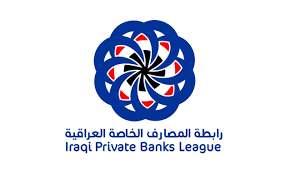
The Association of Private Banks announced today, Sunday, the increase in deposits in the banking sector during the last two years, while indicating the government’s great interest in the recent period in relation to digital transformation in general and the shift towards an electronic payment system.
The Executive Director of the Association of Private Banks, Ali Tariq, said in a statement to the official agency, which was followed by "Al-Eqtisad News": "During the last two years, deposits in the banking sector have increased, but there is still a large amount of cash outside the banking system, as this requires increasing confidence in the banking sector, whether governmental or private, and strengthening this confidence through the Central Bank of Iraq and the Iraqi government, in addition to offering investment programs for deposits that are reflected in citizens' deposits, which may achieve returns for depositors in these banks, and thus there is an incentive and motivation to increase these deposits."
Tariq added, "Strengthening the electronic payment system in Iraq has very positive repercussions on increasing the use of the banking system in payment and settlement operations, whether between citizens and government services or citizens with private commercial institutions," pointing to "the government's great interest in the recent period in relation to digital transformation in general and the shift towards an electronic payment system at the level of financial transactions."
He added, "About 75 percent of the money supply is outside the banking system and requires a great effort to encourage citizens, companies and institutions to use the banking system more, which is currently happening, but this type of work needs to be accelerated to control financial operations in Iraq."
Government Advisor: Financial inclusion to increase from 20% to 48%
The Prime Minister's Advisor for Financial and Economic Affairs, Mazhar Muhammad Salih, confirmed that financial inclusion in Iraq, represented by bank accounts, has increased to 14 million, with 20 million users.
He pointed out in a press statement that “Iraq is witnessing a boom in adopting e-governance as a basis for integrity and financial efficiency.”
He explained that "national indicators confirm that financial inclusion in Iraq has increased from 20% to 48% at present compared to previous years."
He added, "The basis of financial inclusion is the number of personal bank accounts, as inclusion aims to enable individuals and companies to access financial services appropriate to their needs in an easy and reasonable manner, while ensuring legal protection and transparency."
2025 budget on the table of the Parliamentary Finance Committee and the Ministry of Oil
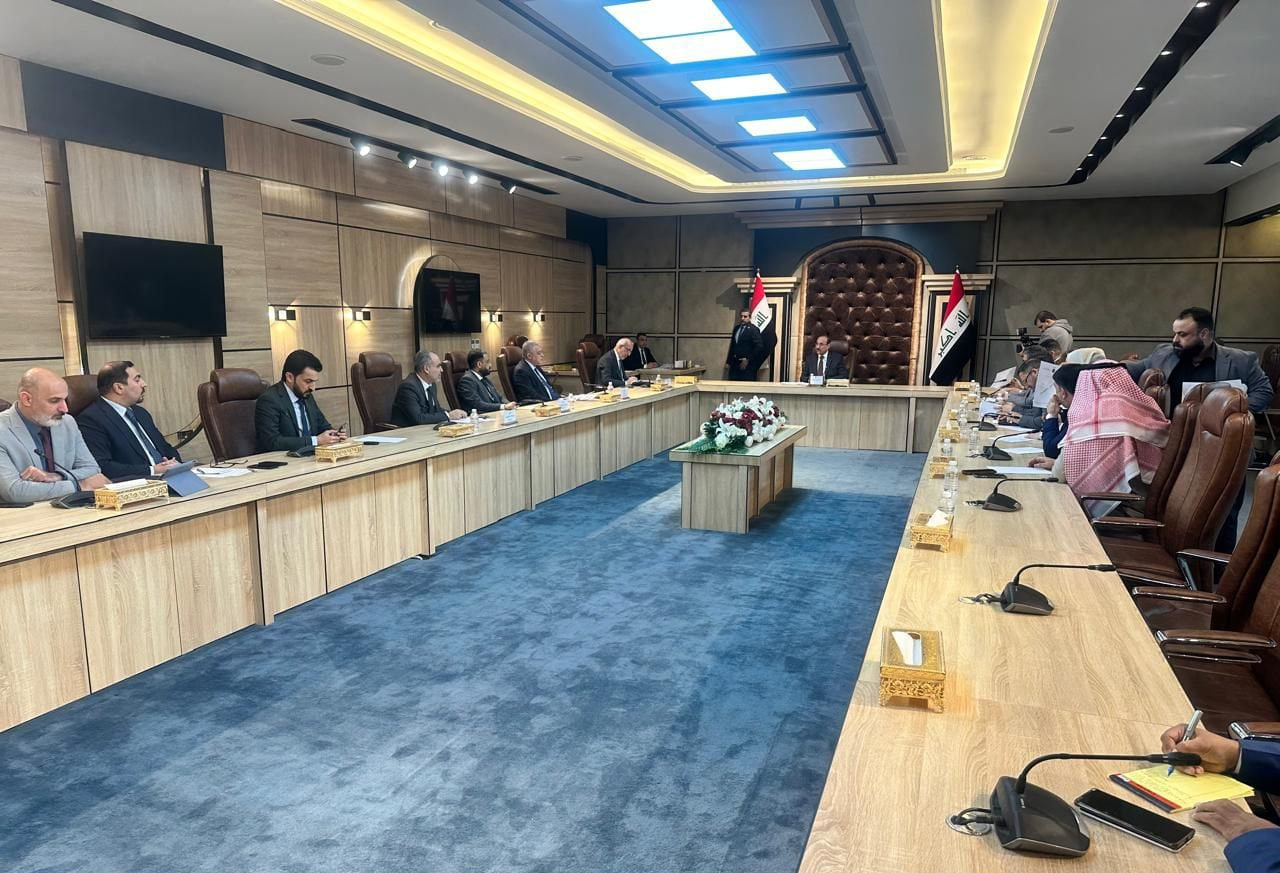
Today, Sunday, the Parliamentary Finance Committee hosted the Undersecretary of the Ministry of Oil to discuss the draft federal general budget law.
The Parliamentary Finance Committee hosted the senior staff of the Ministry of Oil and its Undersecretary for Extraction Affairs, Basem Mohammed Khadir, the Director General of the State Oil Marketing Company (SOMO) Khadir Abbas Abdul, the Director General of the Economic Department Alaa Al-Yasiri, and the Director of the Legal Department in the Ministry, Salam Hamdan.
The hosting came to discuss the draft law of the first amendment to the Federal General Budget Law for the fiscal years (2023-2024-2025) No. (13) of 2023.
Parliament postpones its session until tomorrow, Monday
The Council of Representatives decided, today, Sunday, to postpone its scheduled session until tomorrow, Monday.
The Parliament's media department stated in a statement received by Al-Maalouma Agency, that "the Council of Representatives decided to postpone its session until tomorrow."
The Council of Representatives failed to hold the session due to disagreement over the approval of some laws.
Monetary stability achieves economic stability and sustainable development
On the sidelines of the participation of the Governor of the Central Bank in the opening of the activities of the Arab Sustainable Development Week Forum in its fifth edition, which was held in the Egyptian capital, Cairo, this week, he confirmed that the monetary situation in Iraq is very excellent through the achieved indicators and basic goals on which the monetary policy is based in supporting the government’s orientations to diversify, stimulate and strengthen the national economy, and exit the circle of the rentier economy dependent on oil revenues, which constitutes a major flaw in the structure of the economy.
When there is no diversified production base in the important productive economic sectors, namely agriculture and industry, this cannot be achieved without a strong, solid, and developed banking sector capable of forming the main financing and investment link in financing, qualifying, and developing projects with a productive dimension and increasing the revenues of the general budget by rates exceeding 30% during the years of the National Development Plan 2024-2028.
This requires the necessity of activating the banking sector and stabilizing the pillars of the monetary position, which is in building “foreign reserves, which amounted to more than 100 billion dollars and 153 tons of gold, and constitute an adequacy ratio of 140% to enable the Central Bank to cover and support the defense of the exchange rate, achieve monetary stability, and cover imports, despite the difficult and complex circumstances surrounding the countries of the geographical region.
This enabled the Central Bank to control the general level of prices and inflation, which decreased from 7.5% in January 2023 to 3.8% currently, which is the lowest rate compared to inflation rates in Arab and regional countries, as the Central Bank continues to provide dollars for trade at the official price. It achieved a qualitative shift to regulate foreign trade financing.
New channels have also been opened for transfers using other currencies, such as Turkey, India and China, in addition to European countries. This will make the process of foreign transfers more flexible, streamlined, transparent, controlled and compliant with international standards that enhance confidence and credibility in the operations we carry out.” This means that the Central Bank is moving steadily towards achieving the objectives of monetary policy and achieving economic stability in accordance with Law No. 56 of 2004.
Association of Banks: 75% of the money supply is outside the banking system
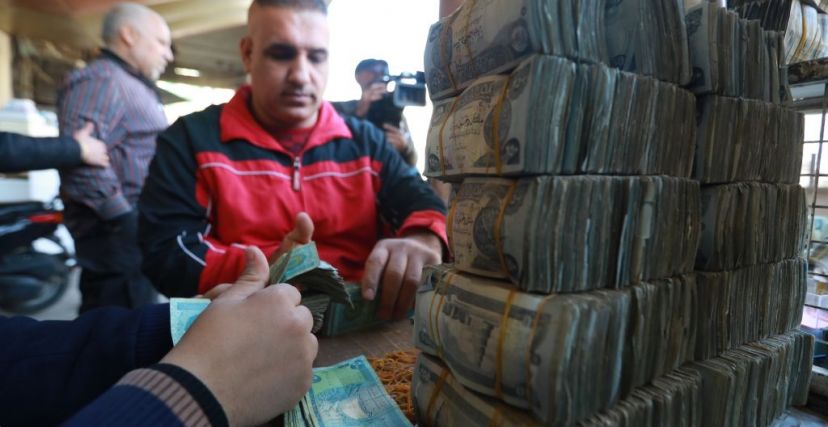
Currency Trading
The Private Banks Association said on Sunday, December 1, 2024, that three-quarters of the monetary mass in Iraq is outside the banking system.
The Executive Director of the Private Banks Association, Ali Tariq, said in a statement followed by "Ultra Iraq", "About 75 percent of the monetary mass is outside the banking system and requires a great effort to encourage citizens, companies and institutions to use the banking system more, which is currently happening, but this type of work needs to be accelerated to control financial operations in Iraq."
Despite what the director said in this regard, the World Bank claimed last February that the infrastructure for electronic payment systems in Iraq is “among the best in the region,” according to a statement issued by the Central Bank of Iraq .
“During the last two years, deposits in the banking sector have increased, but there is still a large amount of cash outside the banking system. This requires increasing confidence in the banking sector, whether governmental or private, and strengthening this confidence through the Central Bank of Iraq and the Iraqi government, in addition to offering investment programs for deposits that reflect on citizens’ deposits, which could generate returns for depositors in these banks, and thus there is an incentive and motivation to increase these deposits,” Tariq added.
The Iraqi authorities have taken steps towards activating the electronic payment system , starting with localizing employees’ salaries, and then installing electronic payment devices in different places, including gas stations. However, many experts and specialists still believe that the culture of electronic payment is not at the required level, for many reasons, including those related to economic and electronic culture, in addition to the fact that the widespread corruption in the country hinders its full implementation.
According to experts , the Iraqi government, through attempts to implement electronic payment, aims to withdraw the cash mass in circulation in Iraq, which amounts to 84 trillion dinars.
TikTok under scrutiny.. Central Bank suspends financial transactions with its agents in Iraq
The Central Bank announced, today, Sunday (December 1, 2024), the suspension of financial transactions with TikTok agents in Iraq.
The Central Bank stated in a document received by "Baghdad Today" that "it was decided to stop incoming and outgoing financial transactions for TikTok agents inside Iraq.

Parliamentary Finance Committee sets a “national path” to end oil disputes between Baghdad and Erbil
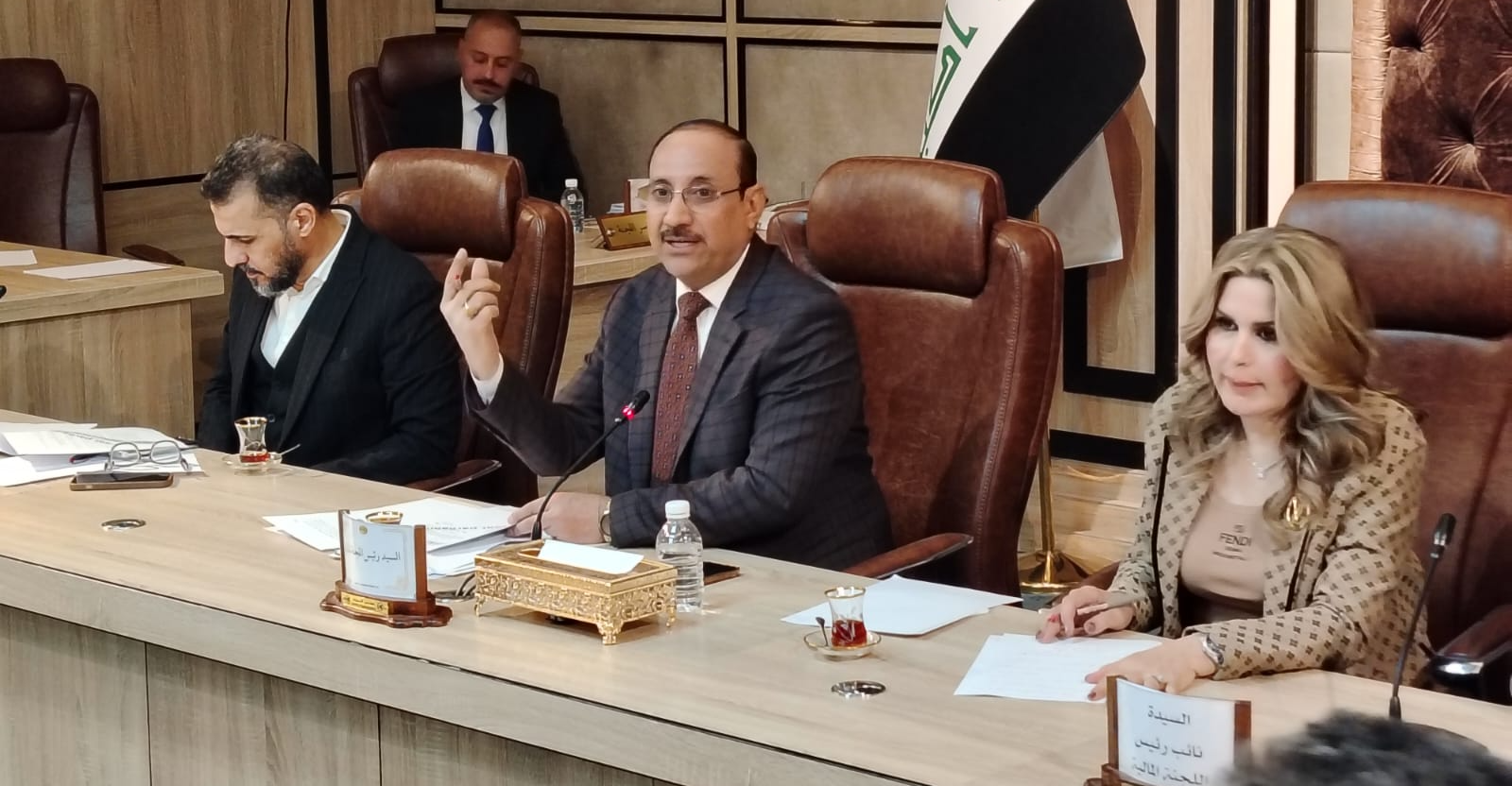
The head of the Parliamentary Finance Committee, Atwan Al-Atwani, announced on Sunday the determination of a "national path" to resolve the oil disputes between Baghdad and Erbil, noting that the committee is preparing a report on amending one of the articles in the General Budget Law.
A statement by the committee received by Shafaq News Agency stated that Al-Atwani chaired an expanded meeting with the senior staff of the Ministry of Oil, in the presence of the committee members and a number of members of the Oil, Gas and Natural Resources Committee. The meeting discussed the files of managing the country's oil wealth and the future of oil prices, as the country's budget is formed by 90% of these revenues.
According to the statement, the meeting discussed developments in resolving outstanding issues with the Kurdistan Region regarding resolving disputes over calculating production costs and adapting foreign companies’ contracts to the Iraqi constitution, with the aim of resuming exports via the Turkish Ceyhan pipeline.
Al-Atwani pointed out that his committee is in the process of preparing its report on amending Article 12 of the General Budget Law, and submitting it to the House of Representatives for the second reading.
He stressed that the Finance Committee held a series of continuous meetings with officials in the federal government and the regional government, and "defined a national path to find a radical solution to this problem on a constitutional and legal basis and in a way that achieves justice in the distribution of wealth among Iraqis."
Al-Atwani stressed the need to set a timetable for implementing the provisions of the oil agreement between the center and the region, in accordance with what was stipulated in the draft law amending the Federal General Budget Law, which the Council of Ministers voted on and sent to Parliament.
In turn, the Undersecretary of the Ministry of Oil for Extraction Affairs, Basem Muhammad Khadir, reviewed the mechanisms for calculating the cost of oil production and transportation, and the most prominent understandings reached with the region in this regard.
The Undersecretary of the Ministry of Oil stressed the necessity for the Federal Ministry of Oil to be responsible for the reservoir management of the region’s oil fields, noting that his ministry has fixed standards for calculating the cost of producing a barrel of oil, whether at the level of fields managed by national effort or those managed by foreign companies.
MP accuses former Iraqi Central Bank employee of being behind US sanctions
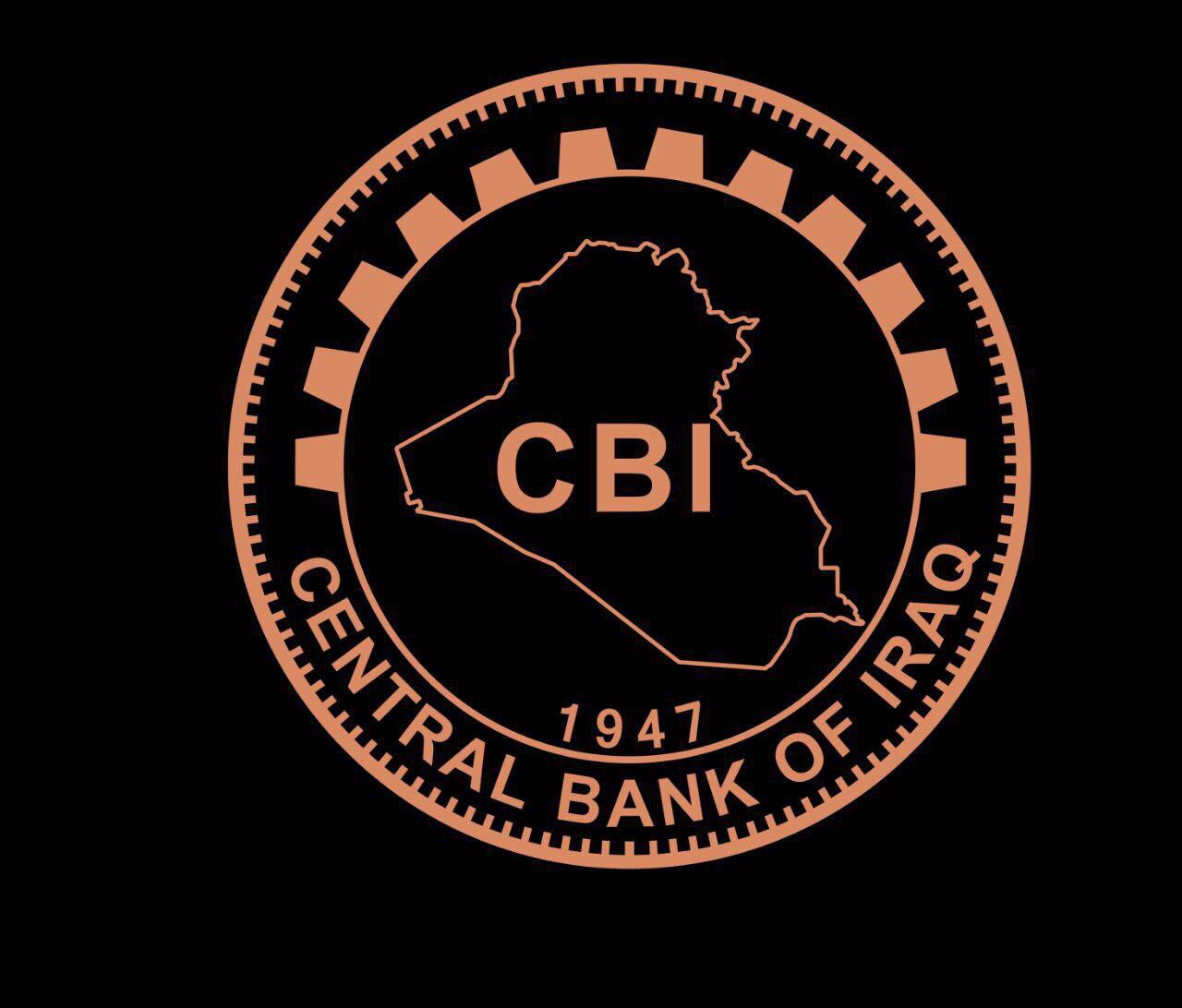
Today, Sunday, the Parliamentary Integrity Committee accused a former employee of the Central Bank of being behind the banking sanctions imposed on some Iraqi banks by the US Federal Reserve.
The number of banks sanctioned is 32 out of 72 banks operating in Iraq.
Member of the Parliamentary Integrity Committee, Vian Dakhil, said in a statement received by (Kalima) that a former employee of the Central Bank hid the emails received from the Federal Bank, JP Morgan and Citibank to inquire about some issues related to the bank’s work.
She added that failure to respond to these issues led to some banks being punished, stressing that most banks do not know the reason for the penalties imposed on them.
On the other hand, economic expert Mustafa Akram Hantoush said that the statements of the members of the Parliamentary Integrity Committee are closer to reality than the statements of the Central Bank of Iraq.
He added that the collapse of the Iraqi banking system and the punishment of 32 Iraqi banks without any clear charges during a period of (a year and a half) is not normal and from the banking work perspective this may be the first incident of this kind in the world.
Hantoush pointed out that the worst thing is the lack of serious solutions from the Central Bank of Iraq to this situation, but rather the move towards cancelling the (Fitr) platform by the end of 2024 and handing over the dollar file to banks affiliated with foreign investors and banks (Jordanian and Gulf), according to Shafak News.
Hantoush wondered whether the Central Bank of Iraq knows that by not finding solutions for the Iraqi banking sector, it will fire the mercy bullet at the entire Iraqi banking system and it will be punished as a whole, which will lay off nearly (100) thousand workers in the Iraqi private banking sector for the benefit of Jordan and the Gulf States, and why are Iraqi banks not guaranteed to open an account for them in the correspondent banks in dollars (Citibank / JP Morgan) like the countries of the region did.
He continued, "Why has the mechanism for cooperation and auditing with Ernst & Young regarding transfers in currencies other than the dollar not yet been determined and announced?"
IDB Joins KRG’s ‘MyAccount Project’

The International Development Bank (IDB) announced on Saturday that it has started processing the salaries of Kurdistan Regional Government (KRG) employees under the “My Account” project, a government initiative aimed at modernizing banking and promoting economic development in the Region.
In a statement, the IDB said it operates 33 branches across Iraq, including two in Erbil and one each in Sulaymaniyah and Duhok. The bank also provides ATM services covering all Kurdistan Region provinces, offering employees access to a range of banking services.
“Our services include personal loans, small enterprise financing, and internationally accepted bank cards at official Central Bank of Iraq rates. We also provide various digital banking services, such as mobile applications,” an IDB representative said.
The “My Account” project, launched by the KRG’s Ninth Cabinet, aims to integrate advanced banking systems into public services and support the region’s transition to e-governance. Participating banks include World Bank, RT Bank, Bank of Baghdad, Islamic Bank of Iraq, National Bank of Iraq, TBI, BBAC Bank, and IDB.
The KRG ministry of finance reported that nearly 700,000 employees have registered for the program, gaining access to financial services provided by the partner banks.
The initiative is part of broader efforts to modernize the banking sector in the Kurdistan Region and streamline government services, ensuring employees have easy and secure access to their salaries and banking options.
Talabani stresses importance of economic development and partnership with German companies

Pavel Jalal Talabani, President of the Patriotic Union of Kurdistan, met in the German capital, Berlin, with Bernd Kreuser, Minister of State at the Ministry of the Interior and the German Federal Assembly.
During the meeting, the importance of economic development and partnership with German companies was emphasized in order to ensure a prosperous and secure future for Kurdistan. Bernd Kreuser presented a book of memoirs to the President of the Patriotic Union of Kurdistan.






No comments:
Post a Comment